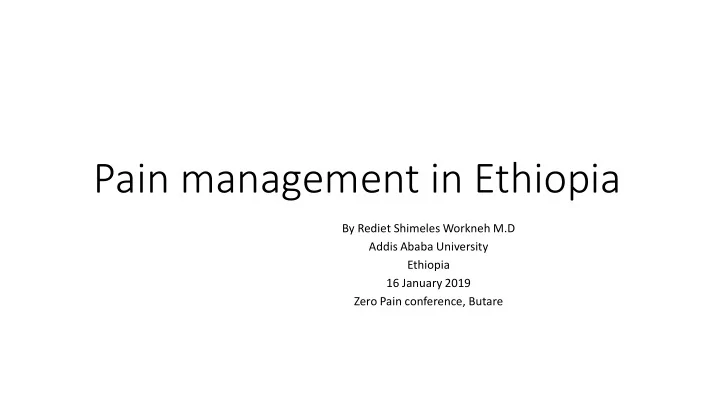

Pain management in Ethiopia By Rediet Shimeles Workneh M.D Addis Ababa University Ethiopia 16 January 2019 Zero Pain conference, Butare
Disclosure • None
Outline • Background • Current practice • Challenges • Way forward
Pain management in Ethiopia • Highly neglected • Knowledge, skill and attitudinal gap among health care providers • Culturally Variable • Economic burden of untreated pain is not well understood • Pain research
• Assessment of Acute Pain Management and Associated Factors among Emergency Surgical Patients in Gondar University Specialized Hospital Emergency Department, Northwest Ethiopia, 2018 70 % of patients report moderate to severe pain after receiving analgesic
Pain Education • Not included in the undergraduate medical curriculum • No included in Anesthesiology curriculum • Lack inservice pain trainings • Other medical specialities give no emphasis on pain management
Challenges • Knowledge, skill, attitude towards pain management • Shortage of drugs and lack of regular supply Ethiopia- extreemly minimal opiod use In 2003 Ethiopia had one of the lowest morphine /capita consumption 0.0005mg compared with the global mean of 5.85mg. Again in 2006, the consumption was reported as 0.0002mg/capita; Uganda 0.3136mg/capita; Mali 0.0181mg /capita; Sudan 0.0230 Kenya; 0.1292mg/ Capita
Challenges… • Bureaucratic system that doesn’t harbour change • Shortage of manpower
Done so far • Recruitmed a team of pain interested anesthesiologists • Just started acute pain service in November 2018 ( mostly orthopaedic and labour ward) • Developed a national perioperative pain guideline • Identified a space for chronic pain unit • Some advocacy work CME on pain management to surgical society of Ethiopia • Pain management is incorporated in Anesthesiology curriculum • Incorporated to Induction program of residents from different specialities
Done so far • Collaboration with the Ministry of health • Identified potential international partners
Remains to be done • Create Multidisciplinary team for pain management • Advocacy • Research and education • Protocols and Guidelines • Create a system that works – consultation and patient followup • Collaboration- local and international • Short term pain management trainings – scale up country-wide
Summary • Pain management is not well understood in Ethiopia • Challenges are expected • We are on the right track with a lot of work remaining. • Being part of the change needed is extremely rewarding.
Thank you
Recommend
More recommend